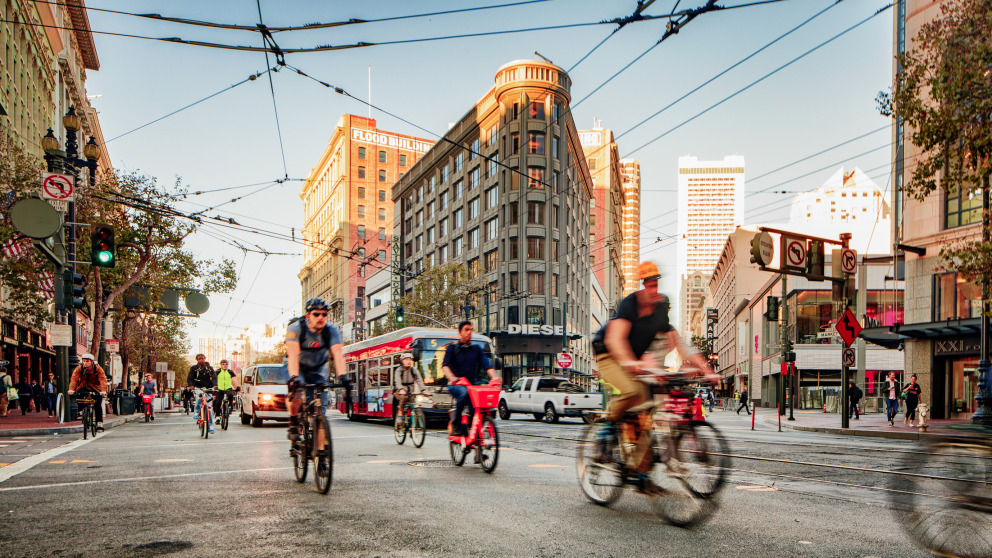Media Continues its Love Affair with Cars
05.08.2019
How do daily newspapers in Germany report on the subject of urban mobility? For a study by the Institute for Advanced Sustainability Studies (IASS) that explores how current and future urban mobility are reported on in the German media, a team of researchers examined a selection of articles from daily newspapers. The study reveals that sustainable forms of mobility are seldom discussed. Similarly, the climate crisis is rarely mentioned in articles relating to mobility and transport. If the articles have one thing in common, it is the implicit assumption that the car-friendly city is desirable.

As part of its efforts to protect the climate, Germany has pledged to reduce greenhouse gas emissions from transport by as much as 42 per cent by the year 2030, compared to 1990 levels. The transport sector accounts for roughly one fifth of Germany’s greenhouse gas emissions. Around 95 percent of transport emissions come from road traffic, with private transport accounting for 76 percent of these emissions.
Although emissions per kilometre travelled have decreased since the 1990s due to improvements in fuel quality and the introduction of catalytic converters, the number of kilometres travelled in Germany has increased tenfold since the 1950s.
According to the German Environment Agency (UBA), this trend has cancelled out the reductions achieved through technical improvements. As a result, the necessary reduction in greenhouse gas emissions remains a distant goal. However, sustainable alternatives to the “car-friendly city” are needed not only to address the climate crisis: many cities are plagued by harmful concentrations of nitrogen oxides and particulate matter, excessive noise, persistent traffic congestion and a lack of open spaces.
How “mobile” are major newspapers in Germany?
But how do German media report on this state of affairs? What narratives of urban mobility do they weave? The qualitative analysis presented in the IASS Study Status Quo statt Verkehrswende is based on 75 articles taken from the six highest circulating daily newspapers in Germany over a period of one year (03.11.2017 to 03.11.2018): BILD, Süddeutsche Zeitung, Frankfurter Allgemeine Zeitung, Die Tageszeitung (taz), Die Welt and Handelsblatt, including the regional sections of Die Welt and Die Tageszeitung.
The study shows that sustainable urban mobility is addressed only incidentally, if at all. Indeed, the articles rarely referred to any alternatives to motorised private transport (i.e. the car). “Surprisingly, the climate crisis was rarely mentioned in connection with mobility,” says Theresa Kallenbach, who co-authored the study – nine out of ten articles failed to mention the climate. Those that did mention it, merely did so in passing, without offering any details on climate policy measures relevant to the transport sector.”
On the other hand, the fallout from Germany’s car emissions fraud scandal and innovations that would boost carmakers’ profits and improve driving efficiency were frequently explored in articles. “The subject of air quality often came up in connection with excessively high nitrogen oxide levels, but these articles tended to focus more on efforts to prevent the adoption of driving bans or about technical details rather than people’s health and well-being,” Kallenbach noted. “The need to improve the design of cycle pathways was mentioned in a small number of articles. Interestingly, safety was a topic that cropped up repeatedly in this connection – i.e. the danger posed to cyclists by right-turning trucks – rather than the fair distribution of public space or the possibility of reducing greenhouse gas emissions by promoting cycling.”
According to Kallenbach, further research is needed to understand how the events of 2019 have affected these debates: “It is quite possible that the success of the Fridays for Future demonstrations, for example, will have an impact on the debate on urban mobility.”
Publication:
Neebe, M., Kallenbach, T. (2019): Status Quo statt Verkehrswende. Narrative urbaner Mobilität in Deutschland. - IASS Study, June 2019. DOI: http://doi.org/10.2312/iass.2019.017
